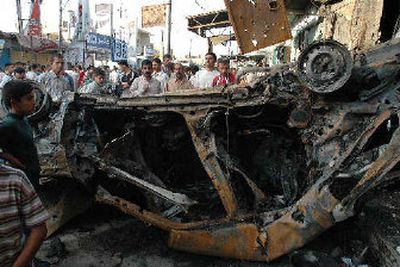Generals: U.S. troops fuel Iraq insurgency

WASHINGTON – The U.S. generals running the war in Iraq presented a new assessment of the military situation in public comments and sworn testimony this week: The 149,000 U.S. troops in Iraq are increasingly part of the problem.
During a trip to Washington, the generals said the presence of U.S. forces was fueling the insurgency, fostering an undesirable dependency on American troops among the nascent Iraqi military, and energizing terrorists across the Middle East.
For all these reasons, they said, a gradual withdrawal of U.S. troops is imperative.
U.S. officials months ago dialed back their expectations of what the U.S. military can achieve in Iraq. But the comments this week showed that commanders believe a large U.S. force in Iraq might in fact be creating problems as well as solutions.
“This has been hinted at before, but it’s a big shift for them to be saying that publicly,” said Michael O’Hanlon of the Brookings Institution in Washington. “It means they recognize that there is a cost to staying just as there is a benefit to staying. And this has not really been factored in as a central part of the strategy before.”
The generals’ comments reflect an evolving outlook that senior military officials and even Defense Secretary Donald H. Rumsfeld have articulated in recent months: The battle against Iraqi insurgents will not be won by the U.S. military, and that the insurgency will go on long after U.S. troops have left Iraq.
“If (the insurgency) does go on for four, eight, 10, 12, 15 years, whatever … it is going to be a problem for the people of Iraq,” Rumsfeld said in June. “They’re going to have to cope with that insurgency over time. They are ultimately going to be the ones who win over that insurgency.”
The generals’ words also represent a definition of military success in Iraq less ambitious than President Bush has given in recent statements.
Last month at his ranch in Crawford, Texas, Bush said that, “When the mission of defeating the terrorists in Iraq is complete, our troops will come home.”
More recently, Bush has offered a more modest definition of success, emphasizing the importance of training Iraqi troops as part of the U.S. mission to defeat the insurgents.
But the ground commanders told Congress on Thursday that the number of Iraqi units at the highest state of combat readiness had dropped since June from three to one. And they pointed this week to ways in which the U.S. troop presence is causing problems.
During his congressional testimony, Army Gen. George W. Casey, the top U.S. commander in Iraq, said that troop reductions were required to “take away one of the elements that fuels the insurgency, that of the coalition forces as an occupying force.”
A smaller U.S. presence could deflate some of the anger feeding the insurgency, Casey suggested.
The same approach might have value across the Middle East, commanders said. Gen. John P. Abizaid of Central Command, who supervises all U.S. troops in the region, said that the broader fight against Islamic extremism requires the United States to “reduce our military footprint” across the region, and to push governments in the Middle East to fight the extremists themselves.
While Abizaid advocates a troop reduction, he does not favor a total withdrawal. He envisions the withdrawal preceded by the establishment of stable governments in Iraq and Afghanistan, and accompanied by an assured flow of oil and enhanced regional security networks.
Fewer U.S. troops also would encourage Iraqi forces to rely more on themselves in the face of an insurgency that could last a decade or more. A reduction in American forces is essential to push more Iraqi troops onto the front lines, Casey said.
“This is about dependency,” he said.
Among Americans, support for the war continues to dwindle, while growing numbers conclude that troops should be withdrawn partially or completely. Only 32 percent of people surveyed for a CNN/USA Today/Gallup Poll released last week approved of Bush’s handling of Iraq, compared with 40 percent last month and 50 percent earlier this year.
The survey also showed that 59 percent now consider it a mistake to have sent U.S. forces to Iraq, up from less than half earlier this summer. And 63 percent believe troops should be withdrawn partially or completely, up 10 points from August. Just 21 percent of those surveyed believed U.S. forces would win the war, while 34 percent said they consider the war unwinnable.
Military officials and others familiar with Casey’s strategy in Iraq say that the United States plans a phased withdrawal, first pulling U.S. troops out of the 14 provinces that commanders believe are most secure. Initially, their presence would continue in the predominantly Sunni provinces of central Iraq, where most of the violence is taking place and the U.S. military suffers most of its casualties.